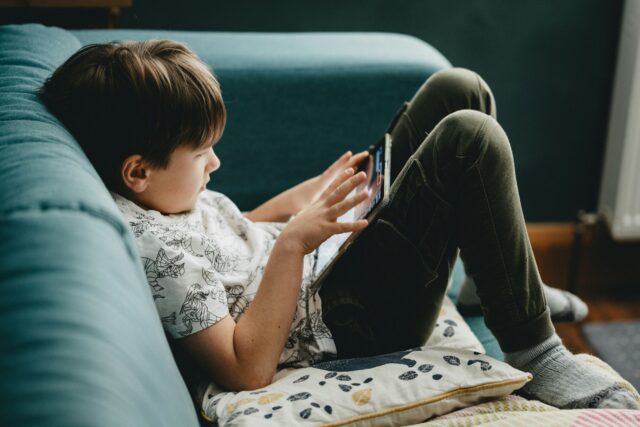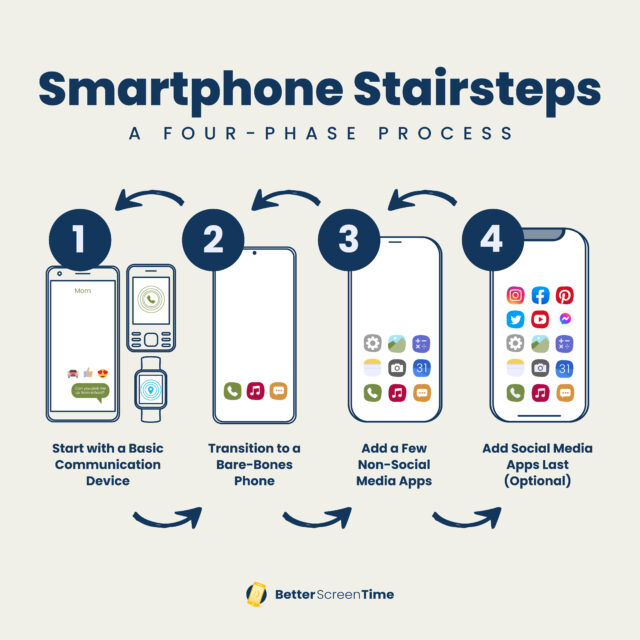Why Delaying Devices is Critical for the Wellbeing of our Kids
This post is a collaboration between Debbie Dennis, founder of Gorge Youth, and Andrea Davis, founder of Better Screen Time. In the forward, Debbie shares her personal journey of noticing an uptick in device use among younger students, partnering with Andrea to bring educational events to Hood River, and helping form Gorge Families Unplugged—a local parent network committed to delaying devices. Andrea’s article offers research-backed insights, real-life stories, and practical strategies for introducing technology to kids in developmentally appropriate ways. Together, this piece blends local action with expert guidance to help families navigate the challenging world of kids and tech.
August 15, 2025

Forward written by Debbie Dennis (Founder of Gorge Youth)
In early 2024, when my daughter was in 4th grade, I started to notice a shift. Several kids her age were getting their first devices—mostly watches, but surprisingly, a few iPhones. That’s when I reached out to Andrea Davis from Better Screen Time—not only for advice, but also to explore how we could help local parents navigate the ever-changing world of kids and technology. We are incredibly fortunate to have Andrea right here in our community—she’s a wealth of knowledge on all things tech and a passionate advocate for delaying devices.
Together, we launched a 2024 series for parents called Navigating Tech Together, bringing in local panelists—doctors, teachers, parents, school safety and prevention experts, and even a nationally best-selling author of Glow Kids. The response from our community was overwhelming. That same year, the Hood River School District adopted a new bell-to-bell policy prohibiting phones and watches during the school day, and formed a Tech Task Force that both Andrea and I are part of.
Last spring, we held our first Gorge Families Unplugged event for parents committed to delaying devices. The turnout was inspiring, and the group decided to keep meeting. Contrary to what many kids insist—“I’m the only one without a phone!”—there are plenty of middle school and soon-to-be middle school kids still unplugged. Parents shared creative solutions, like giving their kids OOMA landline phones so they can easily connect with friends, and advocating for more free public phones around town (my daughter has used the one outside the Hood River Library this summer on a weekly basis).
It feels like the tide is turning. The research is clear, and as Andrea shares in this post, I’ve yet to meet a single parent who says they wish they had given their child a device sooner. Her insights are both eye-opening and encouraging—especially for those of us trying to hold the line just a little longer.
If this is a topic you care about—or even if you’re just curious—the next Gorge Families Unplugged “Back to School” edition will be Tuesday, September 16th, from 7:00–8:30 PM at the Hood River Middle School Library. This event is open to any parent, no matter where you are on the tech journey. It’s a supportive, judgment-free conversation with other local parents navigating the tough decisions around technology
I Wish I Would Have Waited:
Why Delaying Smartphones Matters
Author: Andrea Davis, Better Screen Time
"I wish I would have waited."
As someone who's helped thousands of families navigate tech struggles over the past seven years, this is the phrase I hear most often from parents. Not "I'm glad we got the phone early" or "It worked out fine"—but regret.
The average age for children to get a smartphone in the United States is now just 11 years old! But technology is a powerful tool, so the goal isn't to keep kids completely away from it, but rather to allow access in developmentally appropriate ways—a critical piece of the puzzle that's been overlooked over the past decade.
We've underestimated how addictive these devices are and overestimated how ready our kids are to handle them.
Some may say that the smartphone and tech conversation has been blown out of proportion, but talk to any parent who has lost a child due to online harms, and you will understand that the risks are real and we have a responsibility to protect and teach our children.
The Research is Clear: Early Smartphones Harm Development
A groundbreaking global study published in July 2025 found that receiving a smartphone before age 13 is associated with poorer mental health outcomes in young adulthood, including suicidal thoughts, detachment from reality, poorer emotional regulation, and diminished self-worth. These correlations are mediated through several factors, including social media access, cyberbullying, disrupted sleep, and poor family relationships.
The results were so stark that the researchers called for global restrictions to prevent children younger than 13 from using smartphones and social media.
Rather than focusing on how hard it will be to put off the smartphone for one more year, we need to instead focus on all of the things our kids will gain by getting a smartphone later.
Delaying devices offers significant benefits for our children's cognitive, social, emotional, and physical development.
Rookie Mistakes
It's a true rookie mistake for parents to overestimate their oldest child's experience and ability to manage technology. This is especially common when we don't fully understand what we're handing over.
Our kids ARE good, but social media and online gaming platforms were designed to grab attention and make money, not to keep kids safe. Safety features have always been an afterthought.
So, friend, please trust me—as a mom of 5 who is also raising "good kids."
My oldest child is the poster child of responsibility and maturity. Truly—she was born an old soul. But when we were thrown into the Wild West smartphone era 8 years ago, I really didn't understand what our kids were up against. And I failed her. Thankfully, I soon woke up and we made some drastic changes.
Here's what parents consistently tell me:
- "My child doesn't read books anymore."
- "My child doesn't hang out with friends as much as they used to."
- "My child doesn't look up to acknowledge or talk to others."
- "My child isn't interested in their favorite hobbies anymore."
- "My child doesn't want to go outside or do physical activities anymore."
- "My child is always buried in their screen and doesn't want to talk to me anymore."
- "We have frequent arguments about the phone."
I'm not making this up and I'm not telling you this to "scare you" into submission. I'm sharing this honest advice as a mom of five, a volunteer youth leader, a former teacher, and as someone who's helped countless families with tech struggles for the past years.
These tools were not designed with kids in mind. The Children's Online Privacy Protection Act (COPPA), which justifies 13 as the minimum age for social media, was put in place in 1998—before social media even existed. We can't assume that tech companies are doing what's best for our kids. In fact, you'll see a repeated pattern of tech executives (who know the technology best) delaying access to devices and platforms for their own children—often waiting until age 14 or even 16.

Why Age 14 (Minimum) Makes Sense
While there is no one-size-fits-all approach to handing over a personal device, we finally have some best practices that will help you make an informed decision to protect your child's mental and physical health, relationships, and their innocence.
Brain Development: The prefrontal cortex—responsible for decision-making, impulse control, and emotional regulation—isn't fully developed until the mid-twenties. Children and pre-teens simply don't have the neurological tools to manage the constant stimulation and social pressures that come with smartphones.
Middle School Challenges: Young adolescents are trying to fit in, gauge where they stand with their peers, and discover who they are. Adding the complexity of smartphones and social media during this already turbulent time can be overwhelming. Some families have had such extensive problems that they've asked the middle school principal to keep the phone for months.
Following the Experts: Many Silicon Valley executives—including leaders at Google, Apple, and eBay—delay giving their children smartphones until at least age 14, with data plans often waiting until 16. If the people who create this technology are waiting, shouldn't we?
Based on the research and my experience with families, waiting until at least age 14 for a personal smartphone is wise.
I Know What You're Thinking...
"But what about emergencies?" A basic phone that calls and texts handles real emergencies. Most emergencies parents worry about can be managed through schools, activities coordinators, and other adults.
"Everyone else has one." This is where community action matters. When you link arms with other families (more on this below), your child won't be alone in waiting.
"They need it for school." Most schools don't actually require smartphones. Basic digital literacy can be learned on shared family devices and school computers.
"How will they learn to manage technology responsibly?" Just like we don't teach driving by handing over car keys at age 10, we can teach digital citizenship gradually with supervised practice before full independence.

Success Stories: What Happens When Families Wait
While I hear "I wish I would have waited" from countless parents, what about families who DID delay? Here's what they consistently report:
- Children who maintain interests in sports, reading, and outdoor activities longer
- Stronger family relationships and communication
- Better sleep habits and academic performance
- More confident, independent problem-solving skills
- Deeper, more authentic friendships
The research backs this up: families who delay report children who are more emotionally regulated, have better academic outcomes, and show lower rates of anxiety and depression.
Give Yourself and Your Child an Honest Evaluation
You need to ask yourself if you, as a parent, are you really ready for this responsibility? How have you prepared yourself and your child?
Understand that by handing over a smartphone you are also giving your child access to:
- Cyberbullying
- Pornography
- Online predators
- Self-harm content
- Dangerous online challenges
- Requests for nudes
- Social comparison
- Scams
Years ago I created a self-evaluation called "Am I Ready?" One side of the evaluation is for your teen and the other for you as the parent to help you make an informed decision when it comes to bringing a smartphone into your teen's life.
Every child is different and every family has different needs, so it's challenging to pick a "right" age when your teen will be ready for a phone. But one thing is true—the learning curve is much less steep for families the older and more mature a teen is when they get their first phone.
Smartphone Alternatives
Of course we want our kids to be able to stay connected to friends and family. Thankfully today there are plenty of options to give our kids the connection they need without all of the junk:
- Begin with a starter device: A basic smartphone or watch that can call and/or text. Make it a shared family device that can be sent or used as needed.
- A basic watch: One that can text and is used as needed, not worn during school or as a permanent appendage.
- VoIP Phone: A shared phone line for use at home that can call or text. These phones use the internet (no landline required!) to let your family connect with you or others without any distracting apps or extra features. We've had great success with the Grandstream WP816 WiFi phone connected to the voip.ms service.
Be wary of getting a watch or phone too early assuming that your child is "safer" if you know their location. Constant tracking and texting can actually increase anxiety for both parents and children.
Take it One Step at a Time
The reality is a smartphone with basic functions can be a practical tool for teens to connect with friends, employers, coaches, teammates, and family. The problems start to happen when there are no clear boundaries around the phone and when kids get access to the most addictive features—social media, gaming, and internet browsing.
In 2018, I designed a phased process to help families take a slow tech approach to smartphones and social media—known as Better Screen Time's Smartphone Stairsteps.

This process helps families mindfully choose when and how they introduce a smartphone, starting with basic communication features and gradually adding capabilities as children demonstrate readiness.
Every family's approach will look different and you will likely get some pushback when delaying devices or certain apps. This is normal. The point isn't to outsmart your child on tech, but to build a relationship of trust and communication while still maintaining necessary boundaries.
When You Do Give the Phone: Transition Guidelines
When you've worked through the evaluation, built your support network, and feel confident your family is ready, take the smartphone transition step by step. Here's how to set everyone up for success:
Start Slowly:
- Begin with calls and texts only
- Add one feature at a time based on demonstrated responsibility
- Wait months between adding new capabilities
Establish Clear Boundaries:
- Create phone-free zones (bedrooms, dining areas)
- Set phone-free times (meals, homework, before bed)
- Use parental controls initially, gradually removing them as trust is built
Watch for Red Flags:
- Declining grades or loss of interest in activities
- Increased irritability or mood swings
- Difficulty sleeping or changes in sleep patterns
- Withdrawing from family interactions
- Secretive behavior about phone use
Remember, this transition period is crucial for establishing healthy tech habits that will last. The boundaries you set now and the red flags you watch for will help determine whether the smartphone becomes a helpful tool or a source of family stress.
Link Up: The Power of Community
In The Anxious Generation, Jonathan Haidt talks about linking arms with other parents who want to delay. This collective action makes delaying—or backtracking—so much easier on your child.
This linking starts within our own homes. If you're fortunate to have a parenting partner, then work together to get on the same tech page. Discuss strategies for resetting and how to model better tech habits in your parenting.
If possible, link arms with friends and community members to support you as you work to reset the tech in your home. In Haidt's words, "If you act together to delay smartphones and social media then it will be easier for you and your children to reject the phone-based childhood and choose real-world community instead."
A few families in our community have created our own local parent support group, Gorge Families Unplugged—parents committed to a play-based childhood over a phone-based one. We'd love to have you join us!
Never underestimate the power of a group of parents who know and understand your local challenges and opportunities and who are invested in your community's youth.
Do Your Homework
One of the best pieces of advice I can offer as a seasoned parent is to talk to 3–5 parents who are five years ahead of you and ask how they handled smartphones and devices. Ask parents who will answer your questions honestly and with some vulnerability. As I've helped thousands of parents over the past 7 years, the most common refrain I hear is: "I wish I would have waited."

Let Kids Be Kids a Little Longer
And when I say kids, I mean our pre-teens and teens, too. Delay longer than is comfortable. You won't regret it!
Choose imagination and in-person interaction over Instagram. Building blocks and running down the block over Roblox. Swings and stories over Snapchat.
Delay smartphones, social media, and online gaming. Your child is better off playing, hanging out with friends in real life, and exploring this beautiful place we call home. The Gorge has so much to offer our kids.
Tech has changed; but what kids need has not.
Take Action Today
Ready to join the movement? Here's what you can do right now:
- Take the "Am I Ready?" evaluation to honestly assess your family's readiness
- Connect with Gorge Families Unplugged for local community support
- Talk to three parents who are ahead of you in this journey
- Have an honest family conversation about your tech values and boundaries
- Start modeling the tech habits you want to see in your children
And if you're a parent who's already given a child under 14 a smartphone—or allowed social media before age 16—and you have regrets, it's never too late to turn things around. Check out my guest post on Jonathan Haidt's Substack, After Babel: "It's Never Too Late to Turn Things Around."
The research is clear, the community support is growing, and your children's wellbeing is worth the temporary discomfort of going against the cultural tide.
Let's give our kids the childhood they deserve.





